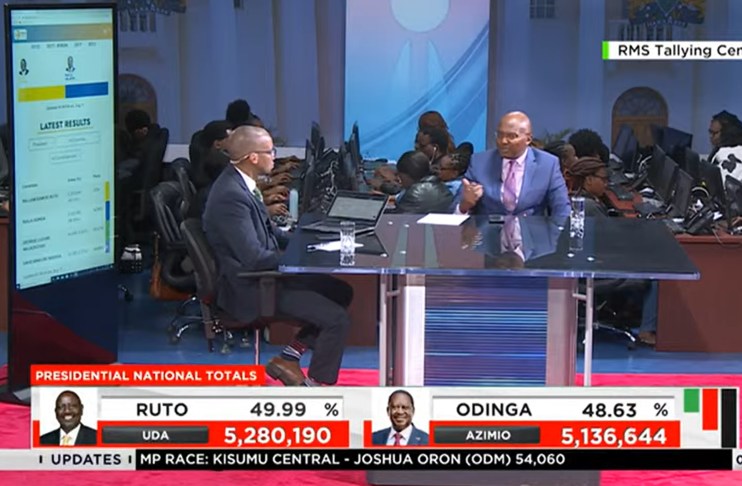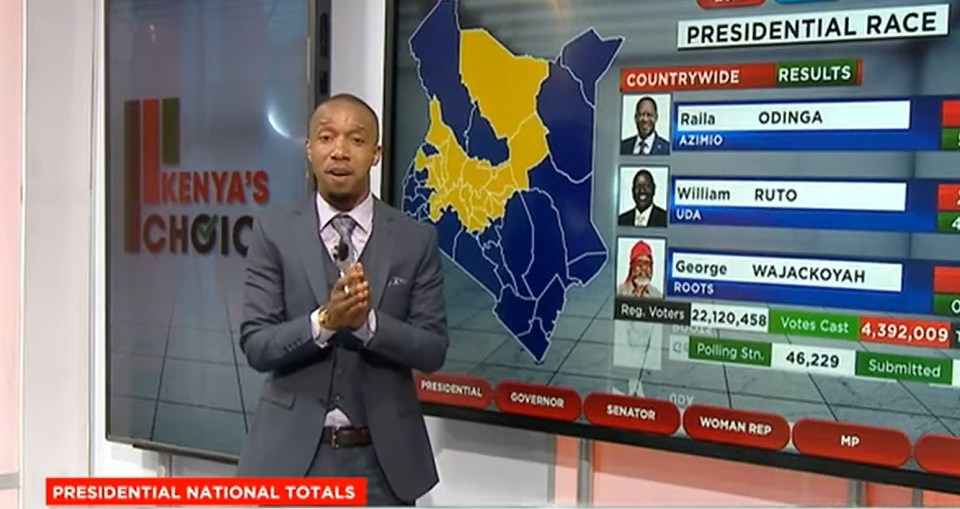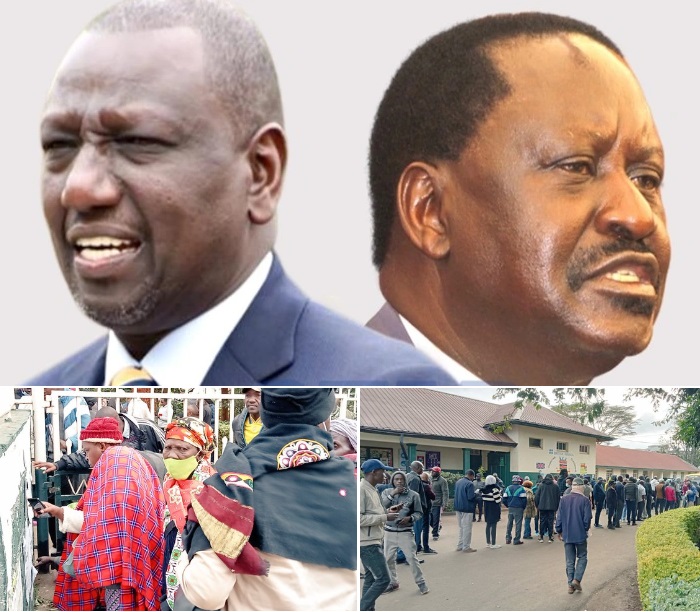Tense Kenya still waits for new president after cliffhanger election: Ruto and Raila in neck and neck race

NAIROBI – Millions of Kenyans are nervously awaiting the results of Tuesday’s presidential election, as day three of vote counting across the country gets underway.
Since Tuesday evening an extremely close race has unfolded between the two main candidates for the presidency.
Opposition leader Raila Odinga, who is backed by the outgoing president and seen as the establishment candidate, faces deputy president William Ruto, who styles himself as an outsider and a “hustler”.
Both Odinga and Ruto are polling close to 50 per cent of the vote, but according to most media, the ‘hustler’ is taking a slight lead at 49.99 per cent of the vote, versus Odinga at 48.63 per cent, as of 9.20 a.m. UK time on Thursday morning (11.20 a.m. local time).
Either Odinga or Ruto will replace outgoing President Jomo Kenyatta leaving government after a decade at the helm.

Lower turnout
More than 22m registered voters had the chance to endorse their favourite candidates in 46,232 polling stations across the country on Tuesday.
However, fewer Kenyans voted. Turnout was just under 60 per cent as polls closed with some voters citing little hope of real change.
The election was considered close but calm. East Africa’s economic hub could see a presidential run-off for the first time.
Economic issues such as widespread corruption could be of greater importance than the ethnic tensions that have marked past votes with sometimes deadly results.
Kenya is a standout with its relatively democratic system in a region where some leaders are notorious for clinging to power for decades.
Its stability is crucial for foreign investors, the most humble of street vendors and troubled neighbours like Ethiopia and Somalia.
The top candidates are Raila Odinga, a democracy campaigner who has vied for the presidency for a quarter-century, and 55-year-old Deputy President William Ruto, who has stressed his journey from a humble childhood to appeal to struggling Kenyans long accustomed to political dynasties.
“In moments like this is when the mighty and the powerful come to the realisation that it is the simple and the ordinary that eventually make the choice,” Mr Ruto told journalists on Tuesday evening.
“I look forward to our victorious day.”
Raila Odinga last night
He urged Kenyans to be peaceful and respect others’ choices.
“I have confidence that the people of Kenya are going to speak loudly in favour of democratic change,” Mr Odinga told journalists on Tuesday evening. A cheering crowd jogged alongside his convoy as he arrived to vote in Nairobi.
To win outright, a candidate needs more than half of all votes and at least 25 per cent of the votes in more than half of Kenya’s 47 counties. No outright winner means a run-off election within 30 days.
Results must be announced within a week, but impatience is expected if they do not come before this weekend.
“What we want to try to avoid is a long period of anxiety, of suspense,” said Bruce Golding, who leads the Commonwealth election observer group.
Outgoing President Uhuru Kenyatta, the son of Kenya’s first president, cut across the usual ethnic lines and angered Mr Ruto by backing long-time rival Mr Odinga after their bitter 2017 election contest.

But both Mr Odinga and Mr Ruto have chosen running mates from the country’s largest ethnic group, the Kikuyu.
Mr Odinga, 77, made history by choosing running mate Martha Karua, a former justice minister and the first woman to be a leading contender for the deputy presidency.
Rising food and fuel prices, debt at 67 per cent of GDP, youth unemployment at 40 per cent and corruption put economic issues at the centre of an election in which unregulated campaign spending highlighted the country’s inequality.
“We need mature people to lead, not someone who abuses people. Someone who respects elders,” said 55-year-old teacher Rosemary Mulima, who arrived at a polling station on Nairobi’s outskirts to find about 500 people in line before dawn.
She had “very high” hopes for Mr Odinga on his fifth try.

The Independent Electoral and Boundaries Commission estimated that final turnout would be above 60 per cent, far lower than the 80 per cent in the 2017 election. That would make it Kenya’s lowest turnout in 15 or even 20 years.
The electoral commission signed up less than half of the new voters it had hoped for, just 2.5 million.
“The problems from (the previous election), the economy, the day-to-day life, are still here,” said 38-year-old shopkeeper Adrian Kibera.
“We don’t have good choices,” he said, calling Mr Odinga too old and Mr Ruto too inexperienced.
Difficulties
Difficulties were reported at times with the electronic voting system, and presidential candidate George Wajackoyah told journalists that some voting kits in his stronghold were not working.
Though polling in low single figures, Mr Wajackoyah and his pledges to legalise marijuana prompted questions over whether he could draw enough votes to force a run-off.
The electoral commission said about 200 voting kits had failed out of more than 46,000, calling it “not widespread” and “normal” for technology to break down at times.
Kenyans hope for a peaceful vote.
2007 violence
Elections can be exceptionally troubled, as in 2007 when the country exploded after Mr Odinga claimed the vote had been stolen from him and more than 1,000 people were killed.
Mr Ruto was indicted by the International Criminal Court for crimes against humanity for his role in the violence, but his case was terminated amid allegations of witness tampering.
In 2017, the high court overturned the election results, a first in Africa, after Mr Odinga challenged them over irregularities.
He boycotted the new vote and proclaimed himself the “people’s president”, bringing allegations of treason. A public handshake between him and Mr Kenyatta calmed the crisis.
This is likely Mr Odinga’s last try. Mr Ruto and Mr Odinga have said they will accept the official results — if the vote is free and fair.
“It is every Kenyan’s hope,” the president told journalists.